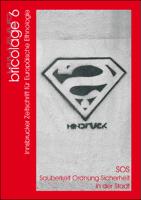SOS
Sauberkeit Ordnung Sicherheit in der Stadt
| dc.contributor.editor | Langreiter, Nikola | |
| dc.contributor.editor | Rolshoven, Johanna | |
| dc.contributor.editor | Steidl, Martin | |
| dc.date.accessioned | 2021-06-28T10:49:44Z | |
| dc.date.available | 2021-06-28T10:49:44Z | |
| dc.date.issued | 2010 | |
| dc.identifier | ONIX_20210628_9783902719720_15 | |
| dc.identifier | OCN: 1262669662 | |
| dc.identifier.uri | https://library.oapen.org/handle/20.500.12657/49700 | |
| dc.language | German | |
| dc.relation.ispartofseries | bricolage | |
| dc.subject.classification | thema EDItEUR::J Society and Social Sciences::JB Society and culture: general::JBS Social groups, communities and identities::JBSL Ethnic studies | en_US |
| dc.subject.classification | thema EDItEUR::R Earth Sciences, Geography, Environment, Planning::RP Regional and area planning::RPC Urban and municipal planning and policy | en_US |
| dc.subject.classification | thema EDItEUR::J Society and Social Sciences::JB Society and culture: general::JBC Cultural and media studies::JBCC Cultural studies | en_US |
| dc.subject.other | Ethnic Studies | |
| dc.subject.other | Urban Planning | |
| dc.subject.other | Graffiti | |
| dc.title | SOS | |
| dc.title.alternative | Sauberkeit Ordnung Sicherheit in der Stadt | |
| dc.type | book | |
| oapen.abstract.otherlanguage | The sixth volume of "bricolage. Innsbruck Journal of European Ethnology" is dedicated to the explosive urban policy issue of cleanliness – order – security, terms that in German merge into the acronym “SOS” (Sauberkeit, Ordnung, Sicherheit). Security in public spaces has become a central agenda of current urban policy and urban planning. Municipalities are increasingly implementing measures oriented toward the guiding principle of the "clean and orderly city". The current discourses and developments require observation and reflection; the relevant debates demand critical cultural studies involvement. The idea and initiative to dedicate this issue of "bricolage" to a critical examination of historically and currently propagated and accepted notions of cleanliness, order, and safety in the city, and of the political concepts and measures currently relying on them, came from Johanna Rolshoven. In the context of a course in Innsbruck in the summer term of 2009, she motivated the students to think and write about this field of her urban research. The sixth volume of "bricolage. Innsbruck Journal of European Ethnology" is dedicated to the explosive urban policy issue of cleanliness – order – security, terms that in German merge into the acronym “SOS” (Sauberkeit, Ordnung, Sicherheit). Security in public spaces has become a central agenda of current urban policy and urban planning. Municipalities are increasingly implementing measures oriented toward the guiding principle of the "clean and orderly city". The current discourses and developments require observation and reflection; the relevant debates demand critical cultural studies involvement. The idea and initiative to dedicate this issue of "bricolage" to a critical examination of historically and currently propagated and accepted notions of cleanliness, order, and safety in the city, and of the political concepts and measures currently relying on them, came from Johanna Rolshoven. In the context of a course in Innsbruck in the summer term of 2009, she motivated the students to think and write about this field of her urban research. | |
| oapen.identifier.doi | 10.15203/2719-72-0 | |
| oapen.relation.isPublishedBy | 7e4aa047-ebd5-4269-b6c8-a86925324b93 | |
| oapen.relation.isbn | 9783902719720 | |
| oapen.collection | AG Universitätsverlage | |
| oapen.series.number | 6 | |
| oapen.pages | 240 | |
| oapen.place.publication | Innsbruck |

